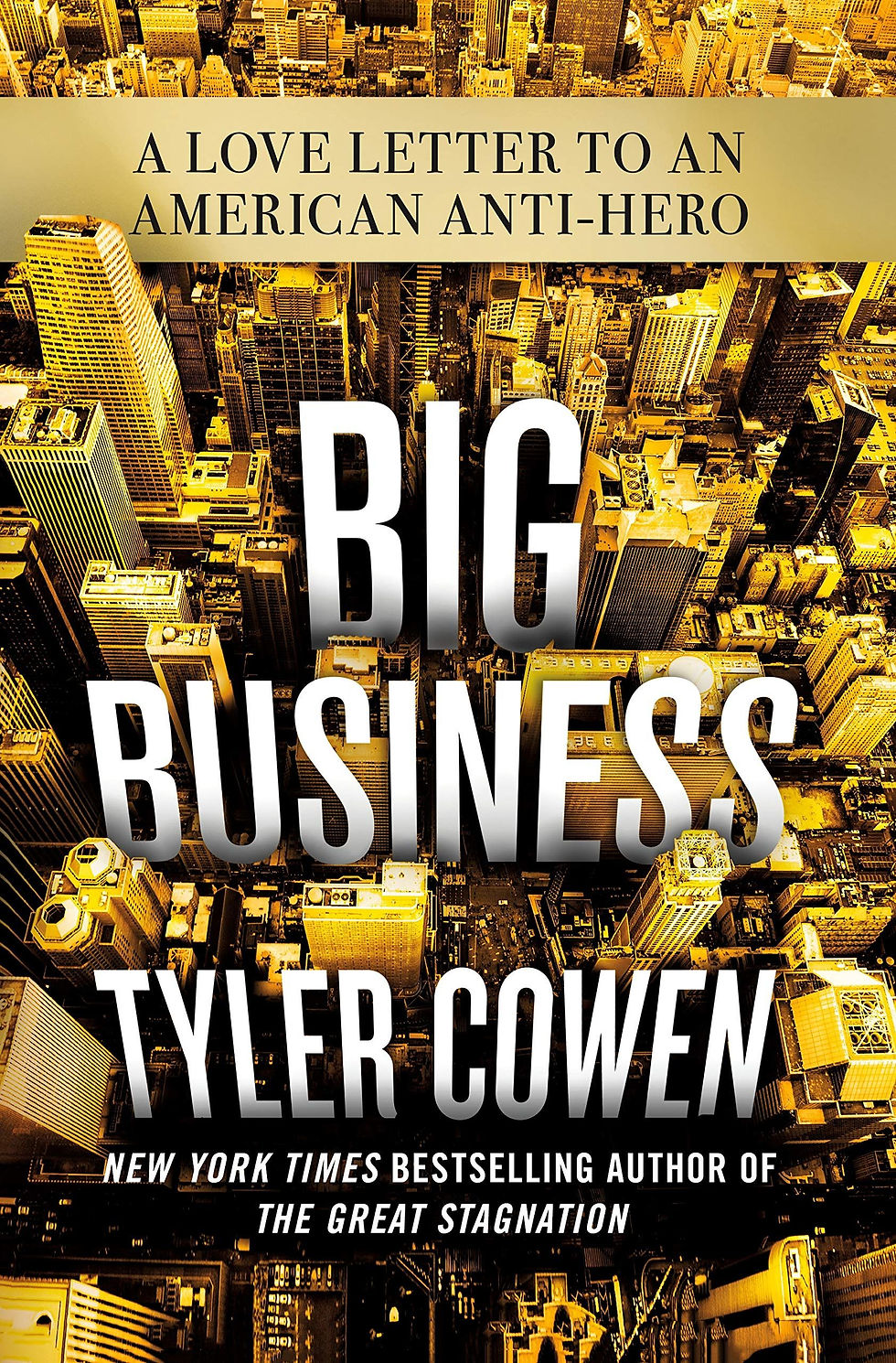Bountiful Big Biz
- Tamara Shrugged
- Jun 21, 2021
- 4 min read
Updated: May 1, 2024
“American business, by enabling so much wealth creation and by creating so many new opportunities, arguably has outperformed any other set of private institutions in all of world history.” – Big Business
In August 2020, Amazon’s Jeff Bezos became the first person to pass the $200 billion mark in net worth, setting off a firestorm of criticism and anti-capitalist rage. Yet, despite the constant protest over corporate and CEO earnings, there is rare objection toward other higher earners. For instance, 26-year-old pop star, Ariana Grande, was the top-earning pop star in 2020 with 72 million, while 32-year-old MMA fighter Conor McGregor topped 180 million. All without any complaint or objection.
Unlike entertainment compensation, CEOs have largely paid their dues through years of scaling the corporate ladder before landing the top job. Globalization has increased job complexity, leaving a scant pool from which corporate boards can choose their leaders. Although the worker-to-CEO pay ratio has soared, most compensation at the top is tied to company performance with the majority paid in bonuses with large payouts, only materializing when earnings are positive.
While politicians love to blame inadequate corporate and individual tax rates for the rise in inequality, these same policymakers are the ones legislating bailouts and dispensing corporate welfare as if it were candy. Tax policy is increasingly based on politics, rather than sound practices, resulting in poor economic performance and uncertainty for business investors.
Some corporations have added social consciousness to their mission statement alongside maximizing shareholder value. By doing so, companies hope to demonstrate their support for tolerance and inclusion towards their customers and workforce. Yet, all this corporate virtue signaling is not necessarily sincere. There is a real fear of cancel culture from the small but loud voices. These concerns resulted in product redesign from companies like Aunt Jemima, Uncle Ben’s, and Eskimo Pie. And while corporations have begun to pander to organizations like BLM, they are also discovering the equally lethal blowback that occurs when wokeness is taken to the extremes.
Tweens, teens, and zoomers are the most anti-capitalists and hostile to big business, having been indoctrinated to oppose them from a young age. Thus, contributing to a complete lack of understanding of how the profit motive promotes innovation or how supply and demand affect prices. Unable to stomach the gamesmanship of competition, they fail to see how a surplus of choices lowers prices and improves services. As a result, big business has become Gen-Z’s favorite straw man for issues like wealth and taxes, where business is deliberately misrepresented to advance a political narrative.
Philosopher and author, Ayn Rand, referred to big business as America’s persecuted minority, a scapegoat to justify more control by the state to do everything from equalizing wealth, determining prices, and setting wages. Seen as the ugly face of capitalism, corporations are regularly maligned for their success. When their growth threatens to overshadow the government, the regime attempts to break them up.
In Tyler Cowen’s 2019 book, “Big Business”, Cowen assesses the pros and cons of large for-profit businesses and concludes that the benefits far outweigh the costs. Recognizing the increasing blame that big businesses and their CEOs have taken for every societal ill, Cowen defends the Titans for creating an incomprehensible amount of value, wealth, and innovation. He exposes the dichotomy between claims of corruption, on the one hand, and the long lines forming to buy the next new iPhone or any product with bleeding-edge technology, on the other. Cowen calls for a more balanced assessment of corporations, who give us jobs, purpose, and social connections, all while satisfying our every want and need through the products and services they create.
Unfortunately, instead of improving quality, cutting costs, and lowering prices, an increasing number of corporations are aligning with the government to reduce their competition through the use of tariffs, regulations, licensing, and subsidies. The result is a perverted form of capitalism called “crapitalism”, a derogatory portmanteau of the word crony and capitalism. Here, business and government collude to bring favor to each other, at the expense of those trying to make it the old-fashioned way. This preferred status helps businesses grow to dominate an industry or increase their market share, all without any need to provide value. As is already the case with government-induced monopolies like public schools and health care, where the absence of competition, has lowered standards and sent costs through the roof.
In a natural market, without government interference, corporations have less and less power over their customers. Instead, consumers vote with their dollars and determine which businesses survive and which businesses fail. A free enterprise system is set up to eliminate poor-performing and antiquated businesses, through innovation and improved quality and costs. When business is allowed to operate without interference from the government, businesses give us products we need, and occasionally ones we didn’t even know we wanted.
With a mere 4 percent of the world’s population, the United States has the largest economy in the world thanks to businesses like Amazon, Walmart, HP, GE, and many more. Before we bite the hand that feeds us, let’s remember their role in increasing our own prosperity.







Comments